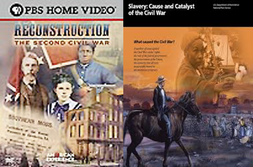
RA; Blogs 2019 Slavery & Reconstruction
Cause and Catalyst of the Civil War" Participants will read the National Park Service publications entitled "Slavery: Cause and Catalyst of the Civil War", and watch the documentary entitled "Reconstruction". They will write, and post two response essays related to the texts. Blog 1, What caused the Civil War? and Blog 2, Victories and Defeats Rebuilding the Nation. Participant essays should reflect their beliefs insights, ideas, teaching strategies etc. related to the ideas presented in both the text and additional online resources. In addition participants will respond to a minimum of two of their peer's posts within the blogs, i.e. at least two responses per blog- four required posts. All blogs can be accessed from the icon link on the left, or from the text link above. Blog posts are due May 11th All responses are due May 15th |
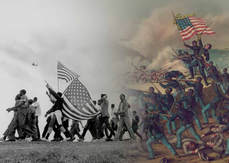
Civil War, Civil Rights: Why They Still Matter
Instructions:All participants will read three articles: David McCullough's "Knowing History and Knowing Who We Are", Robert Hicks op ed in the New York Times, "Why the Civil War Still Matters" and the Teaching Tolerance article, " The Civil Rights Movement: Why Now?" All articles are accessible via the web links above. Each participant will identify 2/3 of their favorite quotes from each document, focusing on the theme "Civil War, Civil Rights, why they still matter", and write why (briefly) this quote appeals to them. In addition participants will respond to a minimum of four of their peer's posts. Chalk Talk quotations and responses are due February 23rd. |

Book in a Day
"While the World Watched" Participants will read the entire text, when finished they will follow the instructions provided below to write a brief summary, and create an illustration which includes a 10-15 word synopsis of their selected portion of the text. Illustrations and summaries will be shared during the field seminar. Reading assignments can be accessed from the icon link or from the text link above. Digital copies of your book in a Day assignment are due March 9th |
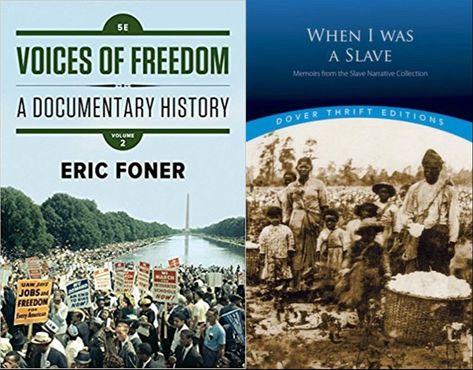
Voices of Freedom & When I was a Slave
Required Readings: There are 31 chapters in "Voices of Freedom, as well as a prologue and epilogue. All participants will read the prologue, in addition each chapter starts with a 1-3 page introduction. The introduction introduces the events and interviewees within each chapter; participants should read the chapter introductions and select at least five individuals in Voices of Freedom and read their account of what occurred There are 36 slave accounts in "When I was a Slave" Participants will select a minimum of 5 voices and read their accounts of what occurred.. Lastly when finished participants should read the epilogue of both texts. When finished with their readings participants should select multiple 'voices' within EACH text, "Voices of Freedom" and "When I was a Slave" and complete a similarities and differences learning activity comparing the voices from the two eras.. Digital copies of the comparative assignment completed with Voices of Freedom and When I was a Slave are due April 13th |

Research Paper & Final Lesson:
Prior to the field seminar participants will select a subject related to the seminar, they will research, write and share a presentation during the field seminar about their subject, including best strategies for teaching the subject in the classroom. Participants should prepare a lesson idea topic of their choice, related to the Civil Rights Field Seminar using best strategies,and be ready to present this idea to the group at the post field seminar. Digital copies of the Research paper are due June 8th. |
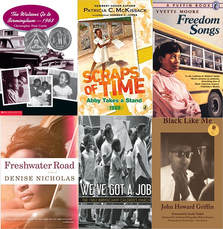
Historical Fiction & Analysis
Participants will receive a grade appropriate historical novel. They will complete the online Historical Fiction Analysis Handout prior to the field seminar and come prepared to participate in a strategy utilizing their assigned novel during the pedagogy sessions. Historical Fiction Analysis forms are due May 4th. |
|
Building Empathy Through Primary Documents (Letters, Photographs & Journals)
The use of primary sources within the History curriculum promotes the development of historical empathy, which in turn helps students cultivate empathy in the present. Using Primary sources helps students to understand that history is fluid and multi-faceted. Primary sources can help students recognize the varied and nuanced motivations and actions of those who lived in the past. Prior to the Field Seminar all participants will select a primary document representing that of someone who lived through the experiences we will be studying. Level I will be expected to select a primary document reflecting the Level I curriculum, i.e. slavery or the Civil War, Level II will be expected to select a primary document reflecting the Level II curriculum, i.e. Reconstruction, the twentieth Century and/or Civil Rights. Elementary teacher may chose from either curriculum set. Participants will identify a way to honor them while on site during the field seminar. Digital copies of the Empathy assignment are due May 25th. Reflective Journal Participants will keep a journal of their personal reflections, learning, and experiences during the travel seminar. Reflective Journals will be completed during the seminar. They will be checked the final day of the seminar. |
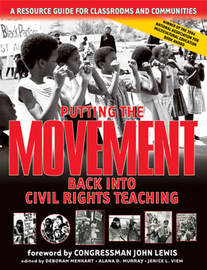
Putting the Movement Back into Civil Rights Teaching.
Participants will receive a text entitled "Putting the Movement Back into Civil Rights Teaching" All participants will read pages 3-22, when finished they will select a lesson within each of the five sections in the text to review. They will read and analyze two of the selected lessons using the lesson analysis form provided on the 'Putting the Movement Back Into Civil Rights Teaching' homepage. Participants will then select one lesson to utilize with their own classes. They will come prepared to share their experience with their peers on the Field Seminar All digital copies of the lessons analysis are due March 23rd. |
Grading Rubrics
Assignment Checklist
Your browser does not support viewing this document. Click here to download the document.

